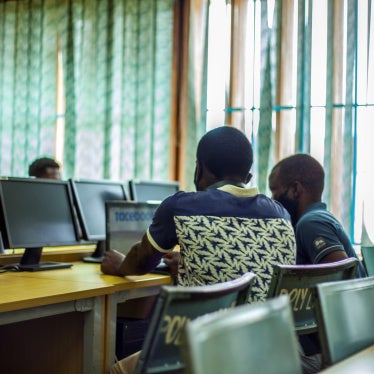This submission relates to Articles 28 and 38 of the Convention on the Rights of the Child, and focuses on the protection of students, teachers, and schools during armed conflict. It proposes issues and questions that Committee members may wish to raise with the government.
Niger in June 2015 endorsed the Safe Schools Declaration, which outlines various commonsense actions that countries can take to reduce the negative consequences of armed conflict on education, including using the Guidelines on Protecting Schools and Universities from Military Use with respect to protecting schools from military use.[1]
Also in June 2015, the United Nations Security Council unanimously adopted resolution 2225 (2015) on children and armed conflict, which:
Expresses deep concern that the military use of schools in contravention of applicable international law may render schools legitimate targets of attack, thus endangering the safety of children and in this regard encourages Member States to take concrete measures to deter such use of schools by armed forces and armed groups.[2]
As of August 2017, Niger was contributing 975 troops and 18 staff officers to UN peacekeeping operations around the world. Such troops are required to comply with the United Nations Department of Peacekeeping Operations’ United Nations Infantry Battalion Manual (2012), which includes the provision that “schools shall not be used by the military in their operations.”[3] The majority of Niger’s peacekeeping troops are deployed in the Central African Republic and Mali— two countries where the military use of schools has been documented as a problem.
Moreover, the new 2017 Child Protection Policy of the United Nations Department of Peacekeeping Operations, Department of Field Support, and Department of Political Affairs notes:
United Nations peace operations should refrain from all actions that impede children's access to education, including the use of school premises. This applies particularly to uniformed personnel. Furthermore, recognizing the adverse impact of the use of schools for military purposes, in particular its effects on the safety of children and education personnel, the civilian nature of schools, and the right to education, United Nations peace operations personnel shall at no time and for no amount of time use schools for military purposes.[4]
We note measures taken by the government of Niger in line with the Safe Schools Declaration to ensure the continuation of education, such as the delivery of alternative education via a radio program for children who cannot travel to school due to insecurity, the relocation of students from high-risk areas to temporary classrooms, and the provision of direct contact lines to school directors in insecure areas so that they may make an appeal for action if a threat develops. We also note preventive steps taken in line with the Safe Schools Declaration, such as raising awareness among teachers about the recruitment of children by armed groups, and risks linked to explosive devices.[5]
Human Rights Watch recommends to the Committee that it ask the government of Niger:
- What steps has Niger taken in line with UN Security Council Resolution 2143 (2014) and 2225 (2015) to deter the use of schools for military purposes?
- Are protections for schools from military use included in any policies, rules, or pre-deployment trainings for Niger’s armed forces?
- What further steps has Niger taken to implement the commitments in the Safe Schools Declaration?
Human Rights Watch asks the Committee to:
- Congratulate Niger for having endorsed the Safe Schools Declaration, and for the steps taken to date to implement its commitments.
- Call upon the government of Niger to take concrete measures to deter the military use of schools, including by bringing the Guidelines for Protecting Schools and Universities from Military Use during Armed Conflict into domestic military policy and operational frameworks, as per the commitment made in the Safe Schools Declaration.
[1] Safe Schools Declaration, https://www.regjeringen.no/globalassets/departementene/ud/vedlegg/utvikling/safe_schools_declaration.pdf (accessed April 10, 2017); Global Coalition to Protect Education from Attack (GCPEA), Guidelines for Protecting Schools and Universities from Military Use during Armed Conflict, March 18, 2014, http://protectingeducation.org/sites/default/files/documents/guidelines_en.pdf (accessed October 19, 2016).
[2] United Nations Security Council, Resolution 2225 (2015), S/RES/2225 (2015), http://www.securitycouncilreport.org/atf/cf/%7B65BFCF9B-6D27-4E9C-8CD3-CF6E4FF96FF9%7D/s_res_2225.pdf (accessed October 9, 2017), para 7.
[3] United Nations Infantry Battalion Manual, 2012, section 2.13, “Schools shall not be used by the military in their operations.”
[4] United Nations Department of Peacekeeping Operations, Department of Field Support and Department of Political Affairs, “Child Protection in UN Peace Operations (Policy),” June 2017.
[5] Global Coalition to Protect Education from Attack, “Report of the Addis Ababa workshop on strengthening the role of armed forces in the protection of education from attack and educational institutions from military use during armed conflict in Africa,” November 2016, http://www.protectingeducation.org/sites/default/files/documents/addis_ababa_workshop_gcpea_report_final.pdf (accessed October 7th, 2017).








